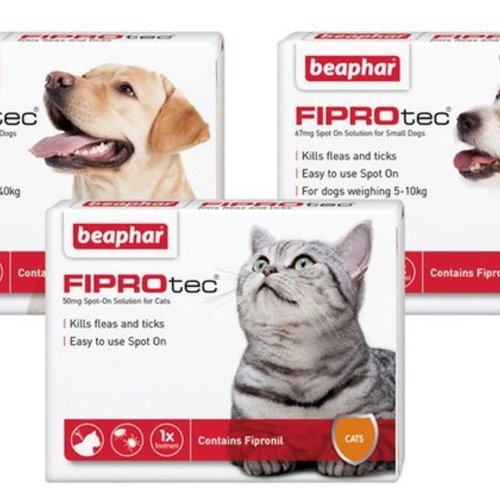Insects and parasites
Insects and Parasites in Dogs and Cats
Young puppies, kittens, and older animals are at a significantly higher risk of worm infections compared to healthy adult animals. These animals often have a less developed or weakened immune system, making it easier for parasites to spread. Therefore, it is essential to provide extra protection for these groups.
Environmental Factors and Risks
Animals that spend a lot of time outdoors, such as dogs that roam freely or live in packs, and cats in catteries or those that often go outside, are at a higher risk of parasitic infections. Animals that come into contact with strays or wild animals, like hunting dogs or cats that catch mice, have an increased risk of infection. Boarding stays or temporary new ownership also heighten the risk. It is therefore crucial to monitor these animals closely for potential parasitic infections and implement the right preventive measures.
Diet and Parasites
Your pet's diet can directly impact the likelihood of parasitic infections. Dogs and cats that come into contact with rodents, slugs, raw fish, or raw meat, including organs, placentas, or aborted fetuses, can contract specific parasites. Ensuring safe and responsible feeding practices is key to preventing infection.
Geographical Location and Travel
Dogs and cats traveling to other regions, for example, for holidays, shows, or with a new owner, may encounter parasites specific to those areas. Upon returning, they can bring these parasites home, which can cause problems. Veterinarians need to consider unknown parasites that they may not have encountered before when diagnosing.
Fleas and Skin Issues
Fleas are a common problem for both dogs and cats. The behavior and health of the animal play a significant role. Animals allergic to flea saliva can develop flea allergy dermatitis (FAD), which manifests as itching, hair loss, broken hairs, and red, crusty skin areas, especially in the back and tail region. Without timely treatment, the lesions can spread to the thighs and abdomen, causing further discomfort. Effective prevention and treatment are essential to avoid these problems.
Giardia and the Treatment with Panacur
Giardia is a common intestinal parasite in dogs and cats, causing diarrhea, weight loss, and gastrointestinal issues. An effective way to tackle Giardia is by using Panacur, a broad-spectrum dewormer. Panacur works by paralyzing and inactivating the parasite, allowing it to be naturally expelled through the stool. To ensure successful treatment, it's crucial to administer Panacur according to the recommended dosage and duration, often over several days. Additionally, keeping the environment clean is essential to prevent reinfection.





